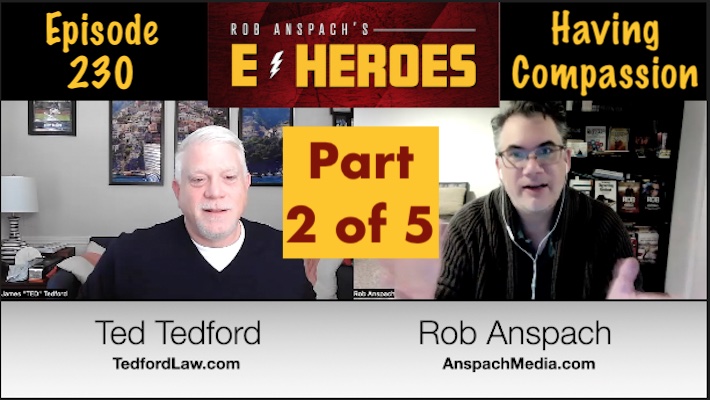Pasadena Criminal Defense and Personal Injury Attorney Ted Tedford sits down with Rob Anspach and shares his thoughts on establishing liability, negotiating the legal system, pain management, mentoring, integrity and self-care on episode 230 of the E-Heroes podcast. This is Part 2 of 5.
Ted Tedford:
So they have arguments for everything <laugh>. Yeah. And the key is quarterbacking the care to make sure that we can sort of avoid some of those pitfalls. And then from there, it’s a matter of building the case, building the story for your client, finding out about them, finding out about not only how the accident impacts your particular client. But every time somebody gets injured like this, they usually have kids, they have a significant other, they have family members that rely on them. And so that really adds, to the whole picture when you can paint it for the insurance company that this is just not an individual who sort of tweaked their neck. Right. This is somebody who’s now out there doing the best that they can to provide for their family and take care of everybody, and usually putting themself last.
Rob Anspach:
Yeah. I mean, you hit it there or you know you try to get their story. Yeah. My son about six months ago was hit and it was just a parking lot collision. Well, the other person was so distracted because she just gotten her nails done. She was preparing for her daughter’s wedding, and so her mind wasn’t on driving, it was on everything else. Sure. So when you can get someone’s story, and the only reason we got that story is because when I went there with my wife to help my son, my wife started talking to the driver. And so I guess when two women start talking, they get the information <laugh>, you know?
Ted Tedford:
Yeah. We don’t always have that luxury.
Rob Anspach:
Right. We certainly don’t get to be there at the scene. So, when injuries like that happen, you have to get witness statements, you have to get stories from both sides. And so, how does sometimes lawyers don’t always have the luxury to do that, but technology today has made it so much easier.
Ted Tedford:
Yeah. Well, I mean, I have employees that work with me and have worked with me for a number of years who are attorneys, paralegals, law clerks. And one of the first things we do is try to get witness statements, recorded statements from the parties involved, or even the independent witnesses so that we can preserve that testimony. And later on if we need to go into litigation to fight with the insurance company in court, then we have that as backup before we go into a deposition and interview them basically under penalty of perjury.
Rob Anspach:
Is California different in some of their rules, insurances, and laws and versus some of the other states?
Ted Tedford:
I think so. I mean, in California we have what we call comparative liability. So that’s one particular difference from a lot of states. And what that means is the fault of an accident can be apportioned. So many times what the defense is trying to do, or the insurance company is trying to do is put fault on the injured party to some degree because that will at least lessen their exposure. You know, in other words, if they see a case that’s worth a hundred thousand dollars and they can shave off 15 to 20%, they’ve just saved $20,000 on that case. Yeah. So that’s one big difference. The other one, I mean, insurance in California is mandatory, but I’d say probably about 30% don’t have it.
Rob Anspach:
Wow.
Ted Tedford:
And there’s really not a lot of enforcement on that issue.
Rob Anspach:
And, what happens if you have an accident with no insurance? Do they go after you?
Ted Tedford:
Nobody goes after them. That’s the problem.
Rob Anspach:
Well, and here you go. You defend because…
Ted Tedford:
They’re judgment proof. I mean, the problem is you have somebody who’s uninsured and if they don’t own an immense amount of property or have assets somewhere that are somehow unprotected you can take a case. And if you go after an uninsured motorist, so for example, if you hit my client and I went after you, I could take it all the way to trial. I could spend $150,000 in costs and three years of time and obtain a 1.5 million judgment for my client. And then you turn around the next day and file a bankruptcy and it’s gone.
Rob Anspach:
Yeah.
Ted Tedford:
So, yeah, I mean, insurance coverage is the name of the game. If not insurance coverage, then you’re looking for corporations and other types of entities that have assets and they can’t declare bankruptcy.
Rob Anspach:
Right. But you also defend the criminal side too, not just, personal injury. And takes a lot more I guess time versus personal injury cases.
Ted Tedford:
Yeah. I mean I think in the criminal defense world, we definitely have to be more hands-on. There are a lot more court appearances. There are a lot more interaction with the client specifically on a day-to-day basis. And the cases move at a much greater rate. In other words you take a case and if it’s a murder case or an attempted murder case, those tend to, to string out a little bit longer. But on your basic felony type cases or even misdemeanor cases, they move at a pretty good clip. You’re talking about three to six months before the case is either at trial or resolved.
Rob Anspach:
Wow. Yeah. Because I know at least in Pennsylvania, sometimes the personal injury case will take two, three years before it even winds its way into court. And then by that time the person has been incapacitated or in hospital, they’re in hospice, wherever they are and all they just want to do is get on with their life.
Ted Tedford:
Yeah, that’s true. So yeah the criminal side moves faster.
Ted Tedford:
Yeah, definitely. Definitely. And it’s, like I say, it’s more hands-on.If you’re in state court, I mean, I handle both criminal and federal and state court and state court actions move at a much greater pace than do federal cases.
Rob Anspach:
You’ve been doing this for 30 years though. I mean you’ve probably seen kids and grandkids and extended family.
Ted Tedford:
I have, in fact, it’s very interesting. Currently, I’m representing the kids of a lot of people my own age who I went to school with high school, grammar school, and now I’m representing their kids. And,who knows, maybe I’ll be around to represent their kids <laugh>, they’ll have triple generation of representation.
Rob Anspach:
How’s that make you feel though? I mean old, <laugh>, well older, but we’re the same age. But when you start helping the next generation.
Ted Tedford:
Well, it feels good. I mean, obviously it, I think says something about the relationship I created with the parent who’s referring their children to me. Right. In the sense that if I’ve represented them or knew them in some other capacity, they still have the trust to send their own child to me and know that I’ll take good care of them and do everything I can to protect them.




